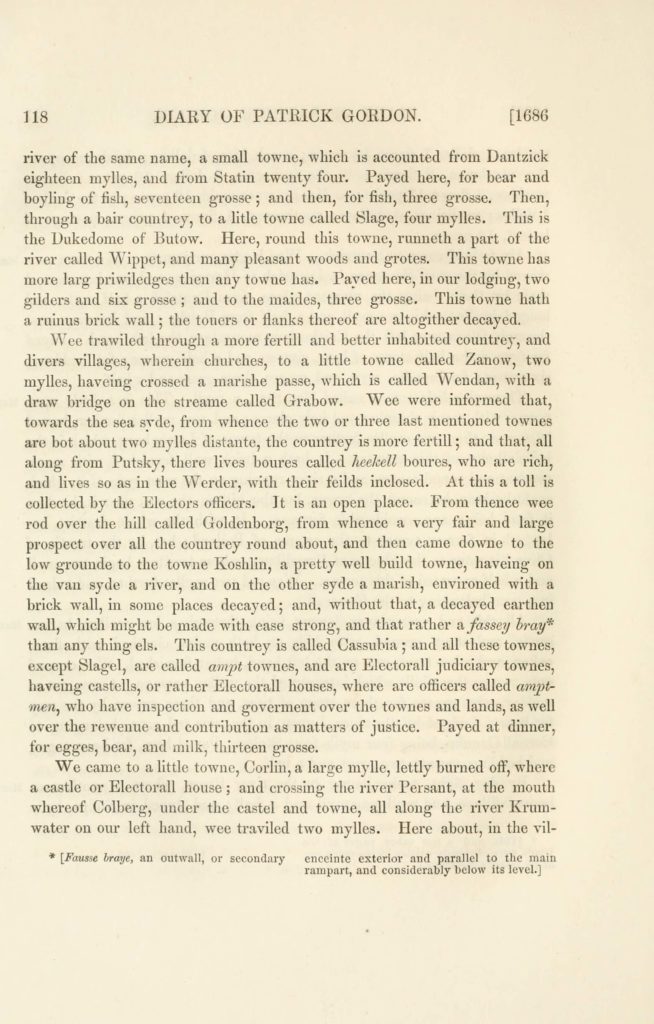
118 DIARY OF PATliICK GORDON. [1686 river of the same name, a small towne, which is accounted from Dantzick
Summary
Passages from the diary of General Patrick Gordon of Auchleuchries : A.D. 1635-A.D. 1699"
118 DIARY OF PATliICK GORDON. [1686
river of the same name, a small towne, which is accounted from Dantzick
eighteen mylles, and from Statin twenty four. Payed here, for bear and
boyling- of lish, seventeen grosse ; and then, for fish, three grosse. Then,
through a bair countrey, to a litle towne called 81age, four mylles. This is
the Dukedome of Butow. Here, round this towne, runneth a part of the
river called Wippet, and many pleasant woods and grotes. This towne has
more larg priwiledges then any towne has. Payed here, in our lodging, two
gilders and six grosse ; and to the maides, three grosse. This towne hath
a ruinus brick wall ; the touers or flanks thereof are altogither decayed.
Wee trawiled through a more fertill and better inhabited countrey, and
divers villages, wherem churches, to a little towne called Zanow, two
mylles, haveing crossed a marishe passe, which is called Wendan, with a
draw bridge on the streame called Grabow. Wee were informed that,
towards the sea syde, from whence the two or three last mentioned townes
are bot about two mylles distante, the countrey is more fertill ; and that, all
along from Putsky, there lives boures called heehell boures, who are rich,
and lives so as in the Werder, with their feilds inclosed. At this a toll is
collected by the Electors officers. It is an open place. From thence wee
rod over the hill called Goldenborg, from whence a very fair and large
prospect over all the countrey round about, and then came downe to the
low grounde to the towne Koshlln, a pretty well build towne, haveing on
the van syde a river, and on the other syde a marish, environed with a
brick wall, in some places decayed ; and, without that, a decayed earthen
wall, which might be made with ease strong, and that rather afassey hrayf^
than any thing els. This countrey is called Cassubia ; and all these townes,
except Slagel, are called ampt townes, and are Electorall judiciary townes,
haveing castells, or rather Electorall houses, where are officers called mn^t-
men^ who have inspection and goverment over the townes and lands, as well
over the rewenue and contribution as matters of justice. Payed at dinner,
for egges, bear, and milk, thirteen grosse.
We came to a little towne, Corlin, a large mylle, lettly burned off", where
a castle or Electorall house ; and crossing the river Persant, at the mouth
whereof Colberg, under the castel and towne, all along the river Krum-
water on our left hand, wee traviled two mylles. Here about, in the vil-
* \Fausse hraye, an outwall, or secondary enceinte exterior and parallel to the main
rampart, and considerably below its level.]
Gordon was brought up and remained a lifelong Roman Catholic, at a time when the Church was being persecuted in Scotland. At age of fifteen, he entered the Jesuit college at Braunsberg, East Prussia, then part of Poland. In 1661, after many years experiences as a soldier of fortune, he joined the Russian army under Tsar Aleksei I, and in 1665 was sent on a special mission to England. After his return, he distinguished himself in several wars against the Turks and Tatars in southern Russia. In recognition of his service he was promoted to major-general in 1678, was appointed to the high command at Kiev in 1679, and in 1683 was made lieutenant-general. In 1687 and 1689 he took part in expeditions against the Tatars in the Crimea, being made a full general. Later in 1689, a revolution broke out in Moscow, and with the troops under his command, Gordon virtually decided events in favor of Peter the Great against the Regent, Tsarevna Sophia Alekseyevna. Consequently, he was for the remainder of his life in high favor with the Tsar, who confided to him the command of his capital during his absence from Russia. In 1696, Gordon's design of a "moveable rampart" played a key role in helping the Russians take Azov. One of Gordon's convinced the Tsars to establish the first Roman Catholic church and school in Muscovy, of which he remained the main benefactor and headed the Catholic community in Russia until his death. For his services his second son James, brigadier of the Russian army, was created Count of the Holy Roman Empire in 1701. At the end of his life the Tsar, who had visited Gordon frequently during his illness, was with him when he died, and with his own hands closed his eyes. General Gordon left behind him a uniquely detailed diary of his life and times, written in English. This is preserved in manuscript in the Russian State Military Archive in Moscow. Passages from the Diary of General Patrick Gordon of Auchleuchries (1635–1699) was printed, under the editorship of Joseph Robertson, for the Spalding Club, at Aberdeen, Scotland, 1859.
